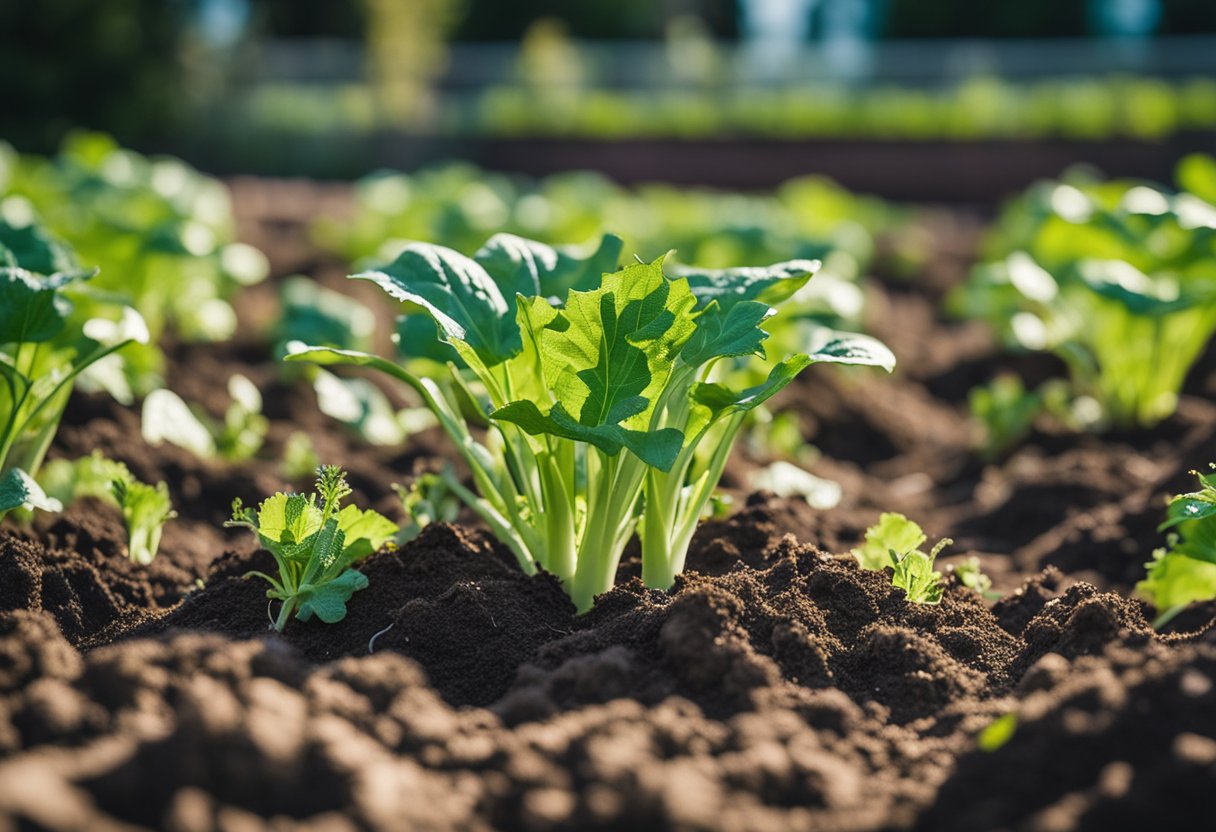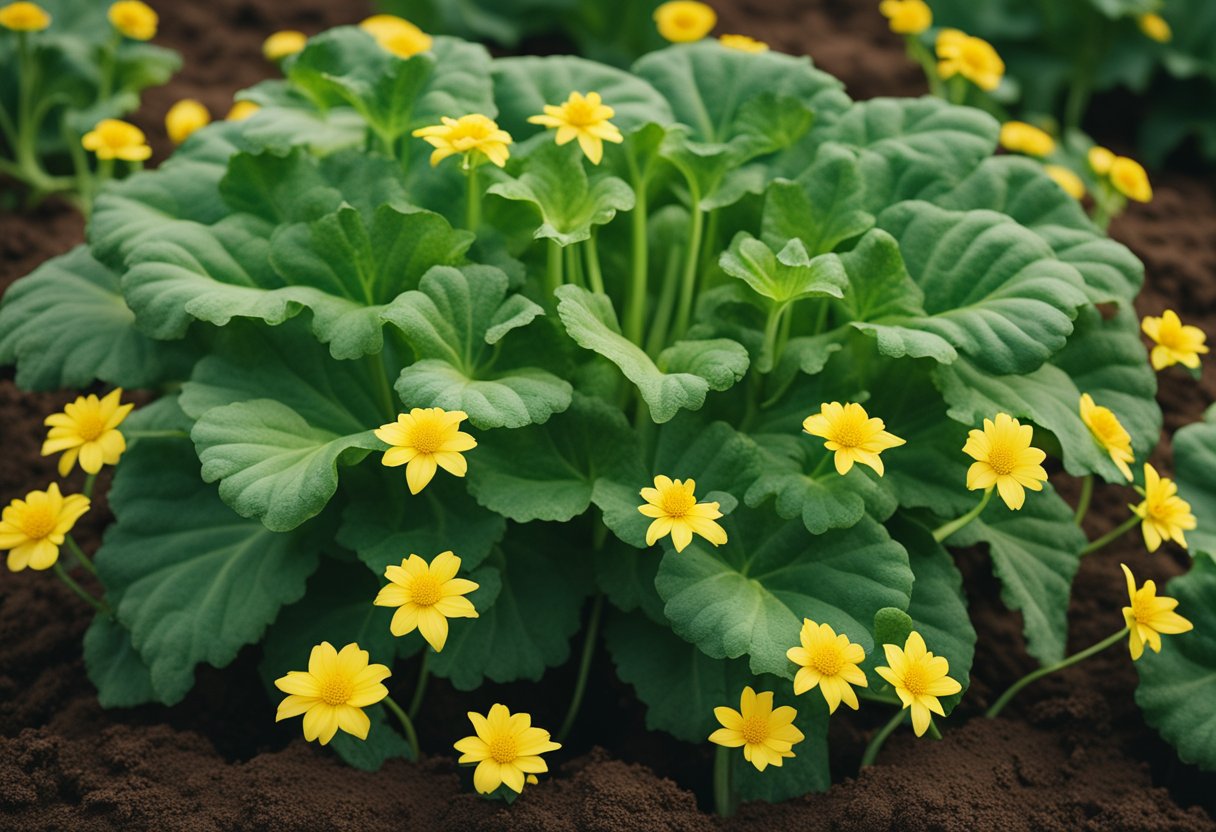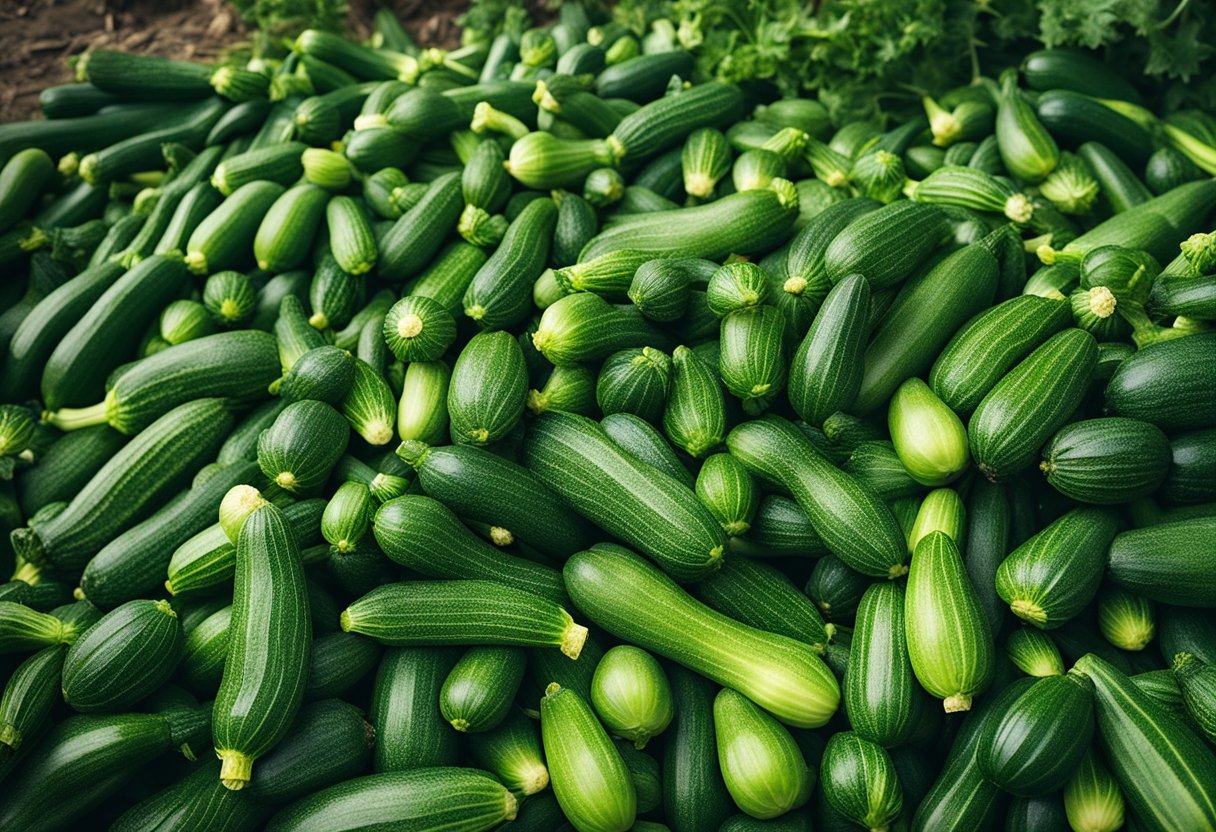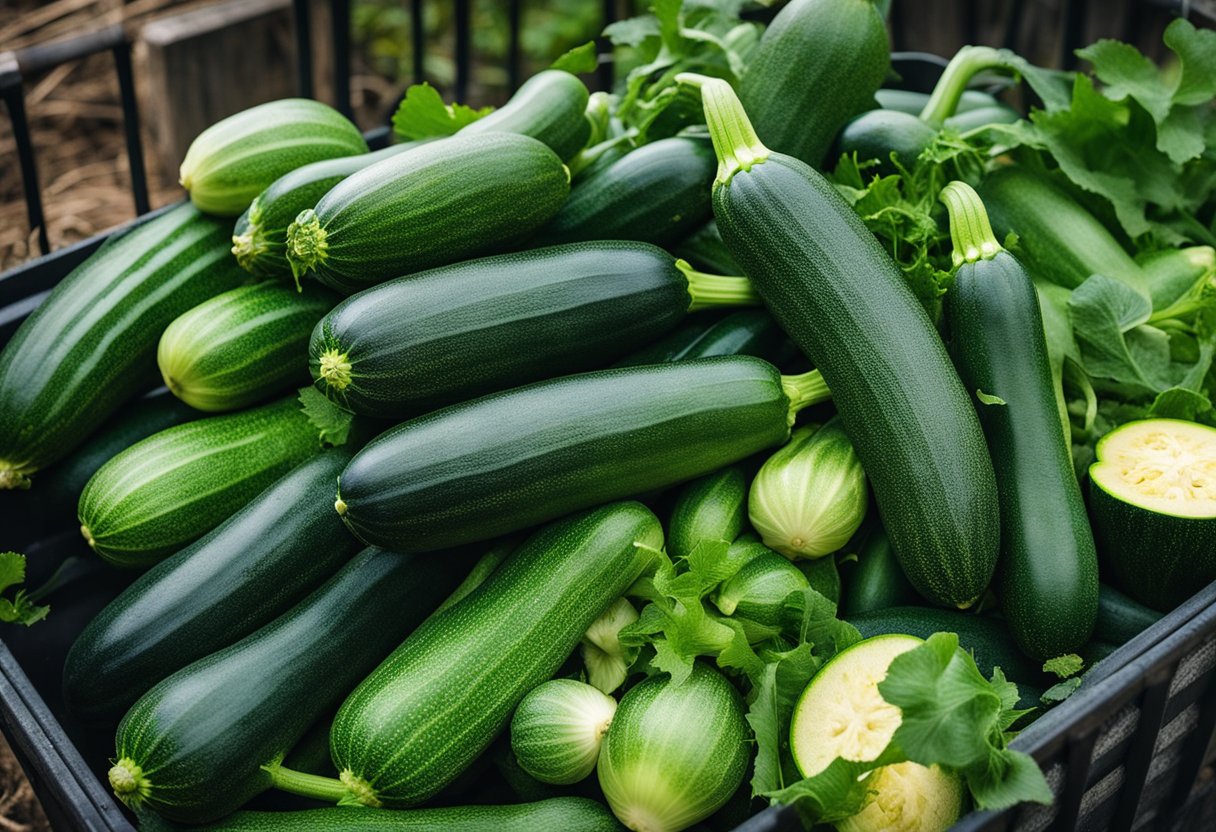As an Amazon Associate I earn from qualifying purchases.
At A Glance
Yes, you can compost zucchini plants. These plants are organic material and will decompose over time in a compost pile. It’s advisable to chop the plants into smaller pieces to expedite the decomposition process. Zucchini plants are considered “green” material, providing necessary nitrogen to the compost pile. When composting zucchini plants, it’s a good practice to balance them with “brown” materials like dry leaves, twigs, or shredded paper to maintain a healthy carbon to nitrogen ratio in your compost pile.
Composting is a great way to reduce waste and improve the health of your garden soil. However, not all plant material is suitable for composting. If you’re wondering whether you can compost zucchini plants, the answer is yes! Zucchini plants are a great addition to your compost pile, as they are rich in nutrients that can help improve the quality of your compost.

When composting zucchini plants, it’s important to remember a few key things. First, make sure to chop up the plants into small pieces before adding them to your compost pile. This will help them break down more quickly and efficiently. Second, avoid adding any parts of the plant that may be diseased or infested with pests. Finally, be sure to balance out your compost pile with a mix of “brown” and “green” materials, such as dried leaves and grass clippings.
Overall, composting zucchini plants is a great way to reduce waste and improve the health of your garden soil. By following a few simple guidelines, you can turn your zucchini plant waste into a valuable resource for your garden.
Understanding Zucchini Plants

Zucchini plants are a type of summer squash that grow quickly and produce abundant fruit. They are easy to grow in a home garden and can be a great addition to any vegetable patch. Zucchini plants are known for their large, dark green leaves and long, slender fruit that can grow up to a foot in length.
Zucchini plants require full sun and well-draining soil to thrive. They prefer warm temperatures and should be planted after the last frost of the season. The seeds should be sown directly into the soil, as they do not transplant well.
Once the zucchini plants are established, they require regular watering and fertilization to produce healthy fruit. Zucchini plants are heavy feeders and require a lot of nutrients to produce abundant fruit. They can benefit from regular applications of compost or organic fertilizer throughout the growing season.
Zucchini plants can be susceptible to a variety of pests and diseases, including squash bugs, cucumber beetles, and powdery mildew. It is important to monitor the plants regularly and take action if any issues arise.
Overall, zucchini plants are a great addition to any garden and can provide a bountiful harvest with proper care and attention.
The Basics of Composting

Composting is the process of breaking down organic matter, such as food scraps and yard waste, into a nutrient-rich soil amendment called compost. The composting process involves microorganisms breaking down the organic material, creating heat and releasing carbon dioxide and water vapor.
There are several benefits to composting, including reducing waste, improving soil health and fertility, and reducing greenhouse gas emissions. Composting zucchini plants is a great way to reduce waste and create nutrient-rich soil for your garden.
To start composting, you will need to gather organic materials, such as food scraps, leaves, grass clippings, and zucchini plants. It’s important to have a good mix of “brown” materials (such as dried leaves or straw) and “green” materials (such as food scraps or grass clippings) to create a balanced compost pile.
Next, you will need to build a compost pile or use a compost bin. A compost pile should be at least 3 feet wide and 3 feet high to maintain the heat necessary for the composting process. You can also purchase a compost bin specifically designed for composting.
Once you have your compost pile or bin set up, you can begin adding your organic materials. It’s important to keep the compost pile moist, but not too wet, and to turn the pile regularly to aerate it and speed up the decomposition process.
The composting process can take anywhere from a few weeks to several months, depending on the size of your pile and the materials you are composting. When the compost is ready, it will be dark and crumbly, and have a sweet, earthy smell.
In conclusion, composting is a simple and effective way to reduce waste and create nutrient-rich soil for your garden. By composting zucchini plants and other organic materials, you can help improve the health of your soil and grow healthier, more productive plants.
Composting Zucchini Plants

When it comes to composting, zucchini plants can be a great addition to your pile. Zucchini plants are considered organic materials, which are an essential component of composting. By composting zucchini plants, you can reduce waste and make use of valuable nutrients, while improving the soil in your garden.
When composting zucchini plants, it’s important to keep a few things in mind. First, make sure you remove any diseased or infected parts of the plant before adding it to the compost pile. This will help prevent the spread of disease to other plants in your garden.
Second, it’s important to cut the zucchini plants into smaller pieces before adding them to the compost pile. This will help them break down more quickly and efficiently. You can use a garden shredder or simply chop them up with a garden knife.
Finally, it’s important to maintain the proper balance of carbon and nitrogen in your compost pile. Zucchini plants are considered a high-nitrogen material, which means you’ll need to balance it out with some high-carbon materials like dried leaves or straw.
Overall, composting zucchini plants can be a great way to reduce waste and improve the soil in your garden. By following these simple tips, you can ensure that your compost pile is healthy and productive.
The Role of Nutrients in Composting
Composting is the process of breaking down organic materials into nutrient-rich soil. To achieve this, the compost pile needs to have the right balance of nutrients, including nitrogen, phosphorus, and potassium.
Nitrogen is a crucial component in composting as it helps to break down organic matter and creates a favorable environment for microorganisms to thrive. Zucchini plants are an excellent source of nitrogen, making them ideal for composting.
Phosphorus is another essential nutrient for composting. It helps to promote root growth and is necessary for the development of flowers and fruits. Zucchini plants are also a good source of phosphorus, which makes them an excellent addition to the compost pile.
Potassium is the third essential nutrient for composting. It helps to promote strong stems and healthy leaves. Zucchini plants contain a significant amount of potassium, making them a valuable addition to the compost pile.
By composting zucchini plants, you can create nutrient-rich soil that is perfect for growing healthy plants. The compost will help to improve soil structure, increase water retention, and reduce the need for chemical fertilizers.
In summary, composting zucchini plants is an excellent way to create nutrient-rich soil for your garden. Zucchini plants are a good source of nitrogen, phosphorus, and potassium, which are essential for healthy plant growth. By composting zucchini plants, you can create nutrient-rich soil that will help your plants thrive.
Preventing Diseases and Pests
As a gardener, it’s important to take preventative measures to protect your zucchini plants from pests and diseases. Here are some tips to help keep your plants healthy:
-
Crop Rotation: It’s important to rotate your crops each year to prevent the buildup of pests and diseases in the soil. Do not plant zucchini in the same location year after year.
-
Identify and Treat Pests Early: Keep an eye out for pests such as squash bugs, aphids, whiteflies, spider mites, and squash vine borers. If you spot any of these pests, take action immediately to prevent them from causing significant damage to your plants. You can use insecticidal soap, neem oil, or other natural remedies to control these pests.
-
Control Fungal Diseases: Zucchini plants are susceptible to fungal diseases such as powdery mildew and downy mildew. To prevent these diseases, avoid watering your plants from above and try to keep the foliage as dry as possible. Remove any infected leaves immediately and dispose of them in the trash, not in the compost pile.
-
Prevent Pathogens: To prevent the spread of pathogens, avoid working in wet soil, which can spread soil-borne diseases. Also, avoid working with zucchini plants when they are wet, as this can spread fungal spores.
-
Protect Against Squash Vine Borers: Squash vine borers are a common pest that can cause significant damage to zucchini plants. To protect your plants, cover the stems with a protective barrier such as aluminum foil or row covers.
By taking these preventative measures, you can help protect your zucchini plants from pests and diseases, ensuring a healthy and bountiful harvest.
Additional Composting Materials
In addition to zucchini plants, there are many other materials you can compost to create nutrient-rich soil for your garden. Here are some examples:
- Mulch: Mulch is a great addition to compost because it adds carbon to the mix. Use shredded leaves, straw, or wood chips as mulch.
- Grass clippings: Grass clippings are another good source of nitrogen for your compost pile. Be sure to mix them with other materials to prevent clumping.
- Weeds: Weeds can be composted, but be sure to remove any seed heads first to prevent them from sprouting in your garden.
- Foliage: The foliage of most plants can be composted, including tomato and potato plants, as well as fruit tree leaves.
- Beans and peas: The foliage and stocks of beans and peas are perfect for your pile. They are a great source of nitrogen and can help balance out the carbon-heavy materials in your compost pile.
- Corn: The stalks and leaves of corn plants can be composted, but avoid adding the cobs, as they take longer to break down.
- Cucumbers: The foliage and vines of cucumbers can be composted, but avoid adding the fruit itself, as it can attract pests.
- Coffee grounds: Coffee grounds are a great source of nitrogen for your compost pile. Be sure to mix them with other materials to prevent clumping.
- Kitchen scraps: Vegetable scraps, eggshells, and coffee filters can all be composted. Avoid adding meat, dairy, and oily foods, as they can attract pests and slow down the composting process.
- Manure: Manure from herbivores, such as cows, horses, and chickens, can be added to your compost pile. Avoid using manure from carnivores, such as cats and dogs, as it can contain harmful bacteria.
- Vegetable scraps: In addition to zucchini, most vegetable scraps can be composted, including carrot tops, onion skins, and broccoli stalks.
By composting a variety of materials, you can create a nutrient-rich soil amendment that will help your garden thrive. Just be sure to follow best practices for composting, such as mixing materials regularly and keeping the pile moist but not too wet.
Temperature and Moisture Levels in Composting
In order to compost zucchini plants effectively, it is important to maintain the correct temperature and moisture levels. The ideal temperature range for composting is between 120°F and 160°F, as this range allows for the breakdown of organic matter and the destruction of harmful pathogens. However, temperatures above 160°F can kill beneficial microorganisms and slow down the composting process.
To maintain the correct temperature range, it is important to regularly turn and aerate the compost pile. This helps to distribute heat evenly and prevent the pile from becoming compacted. Additionally, adding materials high in nitrogen, such as zucchini plants, can help to increase the temperature of the pile.
Moisture levels are also important in composting. The ideal moisture content for composting is between 40% and 60%. Too much moisture can cause the pile to become waterlogged, which can slow down the composting process and lead to unpleasant odors. On the other hand, too little moisture can prevent the pile from breaking down properly.
To maintain the correct moisture levels, it is important to regularly add water to the compost pile. Additionally, materials high in carbon, such as dry leaves or shredded paper, can help to absorb excess moisture.
Composting zucchini plants can also help to improve water retention in the soil. The compost helps to improve the structure of the soil, allowing it to hold onto water more effectively. This can be especially beneficial in areas with low rainfall or dry climates.
Overall, maintaining the correct temperature and moisture levels is crucial for successful composting. By regularly turning and aerating the compost pile, adding materials high in nitrogen, and monitoring moisture levels, you can create a rich and fertile soil amendment that will help improve the health of your garden.
Improving Your Garden with Compost
Composting zucchini plants is an excellent way to improve the soil in your garden and provide essential nutrients for your plants. By composting zucchini, you can create a rich and fertile soil amendment that will help improve the health of your garden.
When you compost zucchini plants, you reduce waste and turn it into a valuable resource for your garden. The composting process breaks down the organic matter in the zucchini plants, releasing nutrients that are essential for plant growth. Compost also helps to improve the soil structure, which can improve water retention and reduce the need for watering.
If you have a vegetable garden, composting zucchini plants is a great way to improve soil health for the next season. You can add compost to your garden beds before planting zucchini or any other vegetables. The compost will help to improve soil fertility, which can lead to healthier plants and better yields.
When to plant zucchini depends on your climate and the specific variety of zucchini you are planting. In general, zucchini should be planted in the spring after the last frost. You can also plant zucchini in the fall if you live in a mild climate.
Overall, composting zucchini plants is an easy and effective way to improve the health of your garden. By reducing waste and providing essential nutrients for your plants, composting zucchini plants can help you grow a bountiful and healthy vegetable garden.
Composting Zucchini Plants After Harvest
After harvesting zucchini, you might be wondering what to do with the leftover plants. Composting zucchini plants is a great way to reduce waste and create nutrient-rich soil for your garden.
When composting zucchini plants, it’s important to remove the roots and any remaining fruit or leaves. This will help the compost break down more quickly and prevent any disease or pests from spreading.
If you live in an area with frost, you can still compost zucchini plants. Simply chop them up into smaller pieces and add them to your compost pile. The colder temperatures will slow down the decomposition process, but the zucchini plants will still break down over time.
Composting zucchini plants is a great way to add nitrogen and phosphorus to your soil. These nutrients are essential for healthy plant growth and can help improve water retention in the soil. By composting your zucchini plants, you’re not only reducing waste, but you’re also creating a valuable resource for your garden.
Other Plants Benefiting from Compost
Composting is not only beneficial for zucchini plants, but also for many other plants. Tomato plants, for example, can benefit from composting. However, it is important to note that tomato plants should not be composted if they have been infected with blight or other diseases.
Trees can also benefit from composting. When compost is added to the soil around the base of a tree, it can help to improve the soil structure and increase the nutrient content of the soil. This can help to promote healthy growth and improve the overall health of the tree.
In addition to providing nutrients for plants, compost can also help to promote the growth of beneficial bacteria in the soil. These bacteria can help to break down organic matter and release nutrients that are essential for plant growth.
Overall, composting is a great way to improve the health and productivity of your garden. By adding compost to your soil, you can help to improve soil structure, increase nutrient content, and promote the growth of beneficial bacteria.
